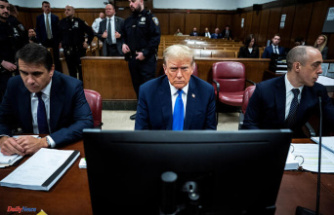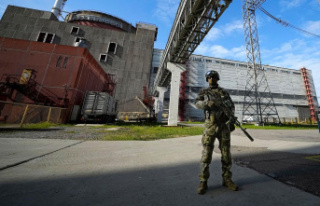The verdict was announced on July 15. Since then, it has been subject to an internal legal review – it should be absolutely watertight. After all, this party order procedure of the SPD is directed against an experienced lawyer: against Gerhard Schröder. The decision of the arbitration commission on the question of whether the former chancellor behaved in a way that was damaging to the party and should therefore be expelled from the SPD has now been announced. It reads, "Not guilty."
In the past few months, Gerhard Schröder has repeatedly made statements that are in line with Russian President Vladimir Putin. After criticism of it, he still went one step further. He apparently finds criticism of his pro-Putin course incomprehensible.
But according to the Commission's assessment, Schröder did not violate the party order. Not because she would approve of his behavior. The three-person committee simply saw no legal basis for an exclusion. Schröder can therefore remain in the SPD. for now.
Party leader Lars Klingbeil's reaction to the verdict sounded a bit defiant and a little helpless. "For us it is clear: Gerhard Schröder is politically isolated with his positions in the SPD." The attempt to force the former chancellor out of the party has failed. Nevertheless: Schröder's victory is not one, at least not an absolute one. The struggle is almost certainly not over, because the 17 plaintiff party branches can now appeal. And such a step would be a much bigger problem for the party than the arbitral award in Schröder's sense.
The SPD simply cannot get rid of the former chancellor. And as long as he is a party member, the impression that Schröder speaks for at least parts of the SPD will not be completely dispelled. The reports about the Social Democrats and their - so far - close ties with Russia will not stop. And then neither about the expected continuation of the regulatory procedure in the next instance. However, voters have never liked inner-party strife, which is a deterrent. "It would be nice if there was finally peace," says a top comrade.
In the past few weeks, however, Schröder had left no doubt that he would not take back any of the understanding he had expressed for the warlord Putin. That it is understandable if Russia sees itself "encircled". That it would be absurd for Ukraine to want back Crimea, which was annexed in 2014. That to solve Germany's energy problems, all you had to do was put the Nord Stream 2 gas pipeline into operation.
The latter would make the country once again dependent on Russia for energy - not to mention the outcry from its allies. Schröder should know all of this. But he was and still is in lucrative service to Russia. In 2005, Schröder became the head of the Nord Stream AG shareholders' committee. For several years he was chairman of the supervisory board of the energy company Rosneft. In May it was announced that he was leaving the post. Shortly before, Schröder had declared that he would not accept an offer on Gazprom's supervisory board.
Nevertheless, instead of showing insight, he gives the "Stern" an interview that culminates in a sentence emblazoned on the title: "Why should I apologize?"
Schröder is simply incorrigible for many social democrats, especially for those who want to shake off the SPD, which they see as cold and neoliberal. Schroeder's SPD. The party that pulled Hartz IV through. Which from this point of view is responsible for the decline of social democracy.
17 district associations, local associations and a sub-district had applied for the party exclusion. And now they are disappointed.
“The arbitration commission says that Schröder has sufficiently distanced himself from Putin and his war of aggression. We don't see that," says Heidelberg SPD district chairman Sören Michelsburg, who initiated the process. “Together with the other 16 branches we are looking at the decision and will decide in the coming days whether to appeal. We want to proceed as unified as possible.” At least one reprimand or sanctions by the party against Schröder should be possible in order to show the distance to the former chancellor.
But what effect would it have if Schröder received a rebuke from the SPD for his commitments to Putin. Or if his right to hold functions in the party were temporarily denied, or if rights from his membership were suspended? Those would be the possible sanctions that the district chief is talking about.
And they would be a joke that would probably amuse everyone in Moscow and in the Schröder household. It was therefore all or nothing from the start: acquittal or expulsion. Those who are in favor of expulsion form one camp in the party.
But there are others. First of all, there are those who never believed that a party expulsion could be enforced. "The decision of the arbitration commission does not surprise me, even if I wanted a different result and at least hoped for a critical classification," says the SPD member of the Bundestag and lawyer Sebastian Roloff. "Since the Thilo Sarrazin case at the latest, we have known how high the bar for a party expulsion is."
And then there is a third group, which includes the SPD member of the Bundestag, Joe Weingarten. “I have always considered the party order proceedings against Gerhard Schröder to be wrong. That's not how you deal with a former chancellor," says the defense politician. "Even if there were statements by Schröder that were clumsy, he has the right to his opinion - and he did less harm to the party than to himself."
It is not right "to want to discipline party members in this way," he explains about the regulatory procedure. “I criticized Gerhard Schröder when he was still chancellor. Now I'm defending him and his party membership," says Axel Schäfer, who has been a member of the Bundestag for the SPD for 20 years. "Schröder's opinion is open to criticism, but not worthy of exclusion."
Also because there was so little prospect of excluding Schröder because of his Putin statements, the federal party had held back in the process and had the lower divisions made. “Perhaps they could have found out a little more before they started a regulatory procedure that has little chance,” was gently reprimanded in Berlin party circles. Should the plaintiffs appeal, the next instance would be the SPD district of Hanover, and the final instance would be the Federal Arbitration Court.
In the case of Thilo Sarrazin, it took ten years for him to leave the party. Not even Schröder's critics want a new edition of the legal dispute, which only ended in 2020.
"Kick-off Politics" is WELT's daily news podcast. The most important topic analyzed by WELT editors and the dates of the day. Subscribe to the podcast on Spotify, Apple Podcasts, Amazon Music or directly via RSS feed.












